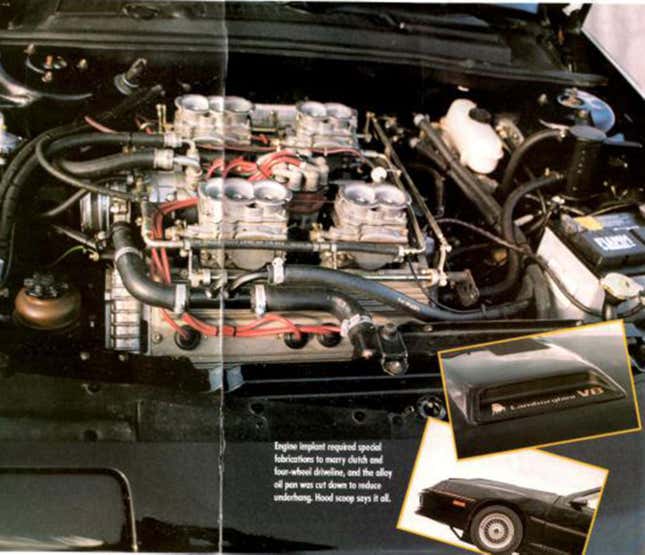Dodge Once Threw A Lamborghini V8 Into A Dodge Daytona

The 1980s were a weird time for Chrysler: The company had just come back from the brink thanks to the versatile K-Car platform which flooded the formerly struggling company with the cash it needed to make a controversial move at the time: the purchase of Lamborghini for just $25 million. This bold move resulted in one of the greatest skunk works car projects of all time: A Dodge Daytona with a V8.
Echo Kellum’s First Car Was a Half-Torched Dodge Daytona
Chrysler’s purchase of Lamborghini seemed to give both companies the boost they needed at the time. On Chrysler’s side, there were futuristic concept cars like the Chrysler Portofino with its four upward opening doors and the Eagle Optima. Lamborghini got the engineering and finances it needed to create the Countach and Diablo. Behind the scenes though, engineering teams were tinkering with a union of Italian and American engineering.
In late 1989, a team led by Lamborghini product programs general manager Jack Stavana came together under one mission: “ look at high-end engine output applications.” At least that’s what he said to Automobile Magazine in 1989. The result of this was the Dodge Daytona Decepzione. It was like something some kid dreamt of one night and then made it up on a napkin. It all started with Dodge Daytona, itself a K-Car variant.
One of the only known images of the Dodge Daytona Decepzione.Screenshot: Bangshift.com
At first glance, it looked like any other Daytona at the time. It had bigger wheel wells, giving it an almost widebody look that a Charger Scat Pack would be proud of. The wheel wells housed wider, Goodyear tires wrapped around three-spoke OZ wheels. Only a hood scoop and a small charging bull decal and the words “Lamborghini V8” let you know this was no regular Daytona.

Screenshot: Carthrottle.com
Engineers took the 3.5-liter V8 from the Lamborghini Jalpa and literally stuffed it under the hood of the Daytona. The whole thing was no small task as the engine bay of the Daytona was only used to holding a 2.2-liter turbocharged I4. The Jalpa’s V8 was tall, so engineers had to attach an A-Car engine bay to the Daytona. The A-Car’s (models like the Plymouth Acclaim and Chrysler Spirit) could be had with an optional V6, so this gave the Daytona the room it needed for the engine to fit. Even that wasn’t enough room however as Barry Winfineld explained in the 1989 issue of Automobile:
…the sheer height of the Jalpa four-cam engine presented other problems. For one thing, its quartet of twin-barrel 42mm Weber downdraft carburetors juts above the hoodline of a normal Daytona. For another, the crankshaft rides high in the engine block, dropping the cast alloy oil pan was below the car when the engine is mated to the transmission. The first of these challenges was met by adding the hood scoop, but the second remains a problem on Stavana’s car even after some of the sump has been trimmed away. The alloy pan still hangs so perilously close to the deck that he had a bash plate fitted to protect it. When the car crashes onto humps and ridges, it does so with noisy impacts you can feel right through the structure.
The oil pan was so low that it’s said it was just a few inches from the ground. The V8 was then paired with a Getrag five-speed manual transmission and most special of all, an all-wheel-drive system—allegedly developed by Lotus and specifically designed for the K-Car platform—with a viscous-coupling differential. The suspension was upgraded as well so that the car could handle the 350 extra pounds of weight the all-wheel drive system and engine added.
The result was a car that was way more engaging to drive with a rev-happy V8 that easily hit its redline early. Winfield said inclement weather conditions prevented Stavana and his team from performing proper performance testing, but he estimated that the car could hit 60 mph in six seconds.
Of course none of this had any sort of production potential; the hassle and extra engineering needed to fit the V8 showed that. Besides, Chrysler had the Viper nearly lined up, ready for production around the same time anyway. It is interesting though how quickly and quietly the Daytona Decepzione faded into automotive history. While it’s too bad Chrysler didn’t do more with the overall idea of a V8 powered, all-wheel drive coupe, it’s great to know that they were at least thinking about it.



